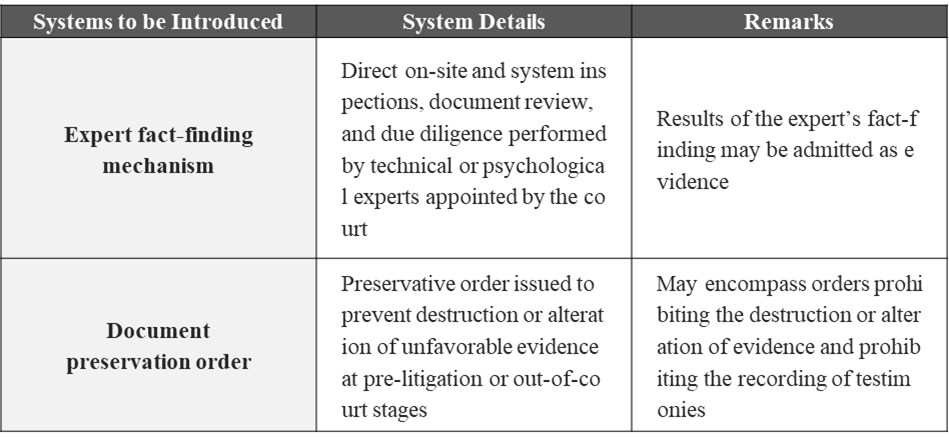본문
The Ministry of SMEs and Startups Unveils Plan to Combat Technology Misappropriation
- Newsletters
- 2025.10.02
On September 10, 2025, the Ministry of SMEs and Startups unveiled a comprehensive policy package aimed at eradicating the misappropriation of technologies from small and medium-sized enterprises (“SMEs”). The key measures include introducing a Korean-style evidence disclosure system ("K-Discovery System”), granting courts the authority to order administrative agencies to submit materials, strengthening administrative investigations, and improving standards for calculating damages.
This initiative marks a major step forward in building a more robust framework for technology protection and in making damages compensation a more realistic redress. Going forward, it is likely that the reforms will extend beyond the Act on Support for Protection of Technologies of Small and Medium Enterprises, leading to broader amendments to related laws, such as the Industrial Technology Protection Act and the Unfair Competition Prevention and Trade Secret Protection Act. It is therefore recommended that companies closely monitor the forthcoming legislative process.
1. Introduction (Ministry of SMEs and Startups Announces Measures to Prevent Technology Misappropriation)
2. Key Measures
3. Significance and Outlook
1. Ministry of SMEs and Startups Announces Measures to Prevent Technology Misappropriation
On September 10, 2025, the Ministry of SMEs and Startups (“MSS”) announced a comprehensive set of policy measures titled the “Plan to Eradicate the Theft of SME Technologies.” The Plan introduces a set of noteworthy institutional and procedural reforms, with the key reform being the adoption of K-Discovery System.
2. Key Measures
(a) Introduction of K-Discovery System
To mitigate information imbalance in technology disputes and to ease the evidentiary burden on affected companies, the MSS plans to introduce K-Discovery System. This can be interpreted as an attempt to introduce a system modeled on the U.S.-style discovery process—which requires the submission of documents and evidence at the request of the opposing party in litigation—in a manner tailored to local practices in Korea. The K-Discovery System is expected to include (i) an expert fact-finding mechanism under which court-appointed experts conduct on-site inspections in damages litigation related to technical data, patents, or trade secret infringement and submit their findings as admissible evidence; and (ii) a document preservation order system designed to prevent the destruction or alteration of unfavorable evidence at pre-litigation or out-of-court stages. Unlike the U.S.-style discovery process which requires parties to broadly disclose documents and evidence at the request of the opposing party, the Korean framework intends to pursue similar policy objectives while tailoring procedures to local practice.

(b) Establishment of an Administrative Order for Submission of Materials
In damages litigation, courts will be authorized to order administrative agencies—such as the MSS and the Korea Fair Trade Commission (“KFTC”)—to submit investigation records and digital evidence. Non-compliance with such orders may result in an administrative fine of up to KRW 50 million.
(c) Strengthened Administrative Investigations
The reforms will allow not only the affected companies but also allow third parties to file anonymous reports of technology misappropriation. In addition, the MSS will be empowered to initiate investigations on its own authority where necessary, thereby enhancing the overall effectiveness of enforcement.
(d) Improved Standards for Damage Calculation and Designation of Specialized Institutions
The standards for calculating damages will be reformed to emphasize the costs incurred in developing the technology. Courts will also be authorized to appoint specialized institutions to provide objective expert assessment of damages, thereby ensuring a more reliable and realistic calculation of losses suffered by affected companies.
3. Significance and Outlook
This reformation initiative by the MSS represents an effort to expand practical tools for protecting SMEs’ technologies—by enhancing evidence-gathering mechanisms, ensuring more realistic compensation for damages, and strengthening administrative investigations. Moreover, these measures are expected to pave the way for broader legislative reforms, extending beyond the Act on Support for Protection of Technologies of Small and Medium Enterprises to related statutes such as the Industrial Technology Protection Act and the Unfair Competition Prevention and Trade Secret Protection Act. It will therefore be important for companies to closely monitor the forthcoming legislative process.
Yoon & Yang’s Trade Secret PG operates as a multidisciplinary platform, bringing together professionals with expertise across diverse technical fields, including electronics, machinery, and chemistry. The PG includes former prosecutors from the Industrial Technology Crime Investigation Division, as well as former officials from the Korea Fair Trade Commission and the Ministry of Trade, Industry and Energy, enabling us to provide solutions grounded in deep institutional insight. Yoon & Yang’s Trade Secret PG delivers swift and effective legal services across domestic and international disputes, legal advisory, and regulatory responses involving trade secrets and industrial technologies. To further enhance our capabilities, Yoon & Yang operates both an in-house Digital Forensics Center and a Discovery Center, uniquely positioning us to investigate trade secret leaks and to support clients in cross-border disputes with differentiated expertise and effective solutions.
- Practice Areas
- #Trade Secret ∙ Industrial Technology






